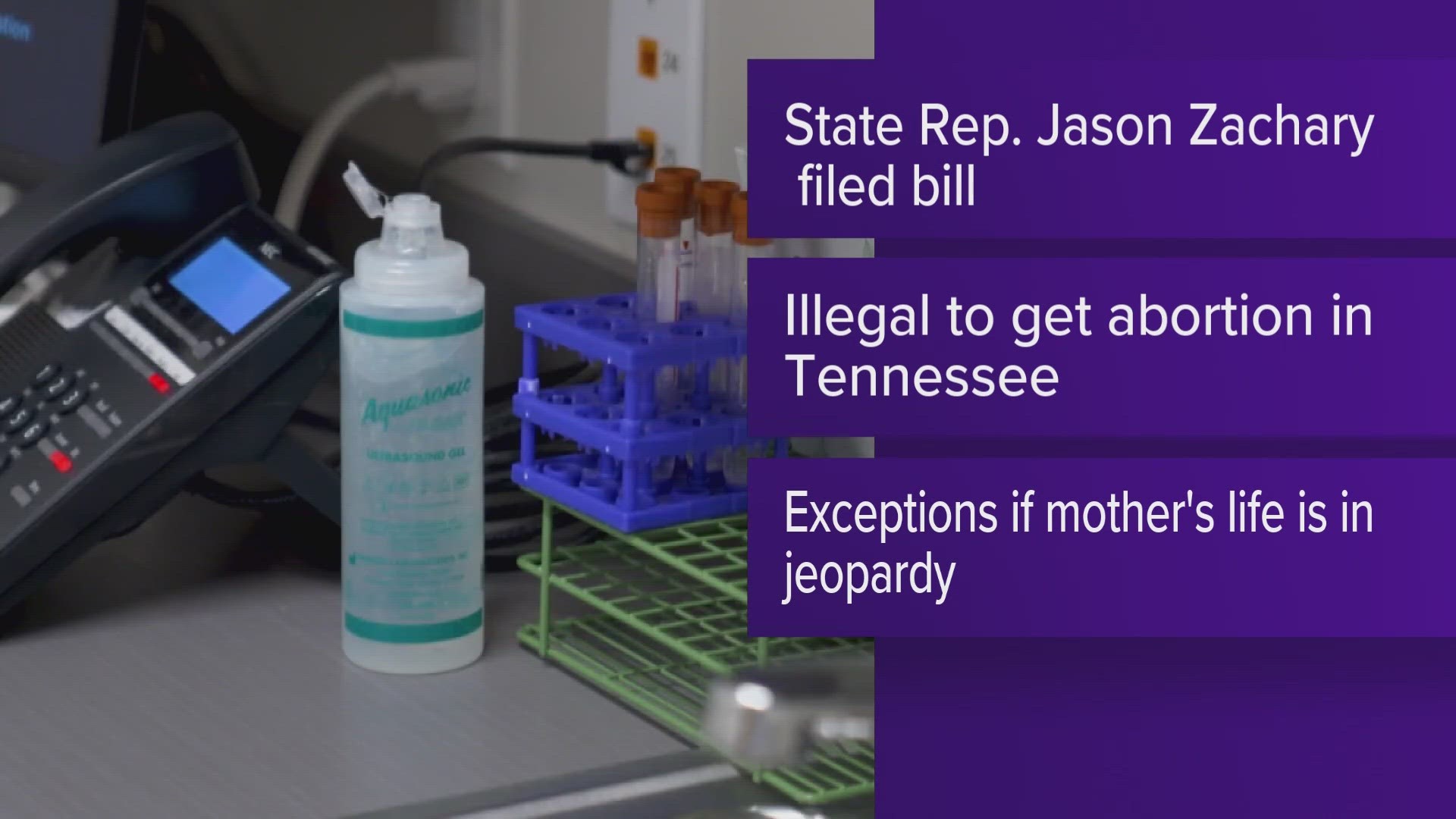NASHVILLE, Tenn. — A bill that would make it a crime to help pregnant minors get abortion care by taking them out of state passed the Tennessee Senate on April 10.
The bill, SB 1971, was introduced by Rep. Jason Zachary (R - Knoxville) and Sen. Paul Rose (R - West Tennessee) and originally, it would have made it a Class-C felony to help minors get abortion treatment. It would have carried a similar penalty to kidnapping in Tennessee.
On April 10, the bill was amended in the Senate.
The bill now says adults commit "abortion trafficking" if they help a minor find abortion care out of state. It also says adults who hide or procure abortion care, including getting abortion care drugs, would face a Class-A misdemeanor for a "criminal abortion." The misdemeanor carries a maximum penalty of around a year in prison.
It would not matter if minors want abortion care, and the bill would not apply to parents or legal guardians of unemancipated minors.
On top of the misdemeanor charge, people who help minors get abortion care could also face civil litigation from the parents of a minor. However, the bill specifically excludes fathers from bringing lawsuits against people if the minor's pregnancy resulted from rape or incest by the father.
It also does not apply to out-of-state medical diagnoses or consultations, as long as they don't involve abortion care.
Two amendments were tabled in the Senate. One would have clarified that birth control is not considered abortion care and was introduced by Sen. Raumesh Akbari (D - Memphis). Another, introduced by Sen. Jeff Yarbro (D - Nashville), would have allowed other adult family members to take minors out of state for abortion care — not just parents.
"We know that part of this is aimed at things that would conceal information from the parents," said Yarbro. "We had a long conversation yesterday about sexual abuse and neglect that can arise in the home, oftentimes arises in the home. The fear that I have if this legislation is passed is if abuse is happening in the home, in order for someone who is pregnant from that abuse to even have a conversation with an adult, they have to get the permission in writing and notarized from the parent."
The House version was amended to exempt minors with a medical diagnosis, or out-of-state consultation about pregnancy care. The diagnosis or medical care specifically could not include abortion care, or arrangements to travel for abortion care.
"SB 1971 is a direct attack on young people's lives and ability to have thriving futures. Further, this bill impacts all of us and our ability to live self-determined lives: to support loved ones, share information, and freely express our political views without fear of jail time or a lawsuit,” said Briana Perry in a previous release on the un-amended bill, the Interim Executive Director of Healthy and Free Tennessee.
The amended bill passed 26-3 in the Senate on April 10.
The House version's sponsor, Rep. Jason Zachary (R - Knoxville), previously said it was meant to be a parental rights bill. The House version passed the House Health Committee in February, but it was put behind the budget in the House's Finance, Ways and Means Subcommittee.
“Abortion is a safe, and time-sensitive health care procedure, and it remains legal in some nearby states,” said Ashley Coffield in a previous release, CEO of Planned Parenthood of Tennessee and North Mississippi. “Targeting trusted adults, family members, and helpers who assist minors in accessing abortion will have a chilling effect and is dangerous and irresponsible. If you know a minor who miscarries, you’re a potential suspect.”
The release also said the bill could be especially dangerous for minors living in abusive situations.
“Most minors involve a parent in their decision to get an abortion. But for young people living in abusive households, disclosing sexual activity or pregnancy can trigger physical or emotional abuse, including direct physical or sexual violence, or being thrown out of the home. This bill makes criminals out of trusted adults, including other family members, who can help in these circumstances," the release said.
Idaho has been the only state to enact a so-called "abortion trafficking” law. The first-of-its-kind measure made it illegal to obtain abortion pills for a minor or help them leave the state for an abortion without parental knowledge and consent.
A federal judge blocked the law after reproductive rights groups sued to challenge it.

